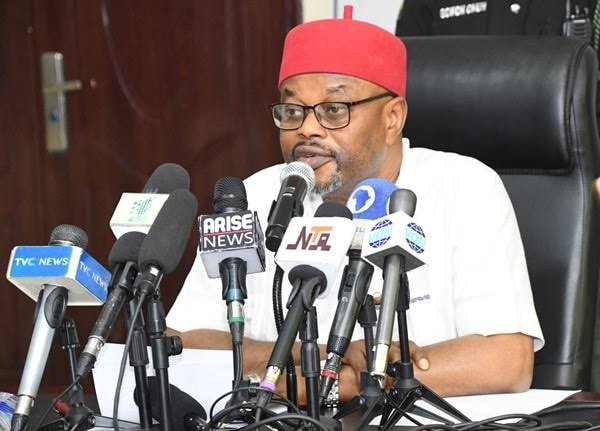The Federal Executive Council (FEC) has approved the launch of four new satellites. The goal is to improve security surveillance and enhance Nigeria’s capacity for Earth observation.
The Minister of Innovation, Science and Technology, Uche Geoffrey Nnaji, made this announcement in Abuja. He spoke at the 22nd National Council on Innovation, Science and Technology (NCIST), which ran from May 12 to May 14.
The event had the theme: “Research, Develop, Innovate and Commercialise: A Cycle for National Prosperity.”
Nnaji said the new satellite mission includes three Earth observation satellites and one synthetic aperture radar (SAR) satellite. The SAR satellite can collect images in any weather, day or night.
“Just last week, the Federal Executive Council approved that Nigeria launch four satellites, satellites that are worth millions of dollars,” the minister said.
“Three are Earth observation satellites, and one is a search satellite,” he added.
“The search satellite is the one that will pick images both day and night, during rain, and every time of the day, and that is technology in play,” Nnaji stated.
He explained the importance of this development for Nigeria’s fight against insurgency and terrorism.
“The military can use it effectively, unlike now, when we want to go and view Sambisa Forest and some of these dungeons on guerrilla warfare; we have to buy images and data,” he said.
Strengthening Research, Innovation, and Funding
The minister also spoke on the National Science, Technology and Innovation Policy. He said a committee is reviewing it. Their aim is to create the National Research and Innovation Fund.
“As a country, we can no longer afford to ignore the widening gap between research and real-world impact,” Nnaji said.
He noted that many research findings in Nigerian universities remain disconnected from industries and government policies.
“Our talented young innovators, full of bold ideas and boundless creativity, have often lacked the structured support, financing, and mentorship required to move their innovations from concept to the market,” he added.
He encouraged universities, the private sector, and government agencies to support the cycle of Research, Development, Innovation and Commercialisation (RDIC).
“Scientists and researchers must continue to push the frontiers of knowledge,” he said. “The private sector must strengthen collaboration with academia through investments in Research and Development (R&D).”
He also said regulatory frameworks must support and protect innovators and new inventions in Nigeria.
Nnaji confirmed that resolutions from the 22nd Council would be presented to FEC for adoption. The 23rd edition, which had been delayed, is now in planning and will be restored to its regular schedule.
Stakeholders Call for Unified Action and More R&D Spending
Mrs. Esuabana Nko-Asanye, Permanent Secretary at the ministry, said science and innovation are key to solving national problems.
“This meeting is a call to action,” she said, “towards creating a dynamic ecosystem where all sectors work together towards building a prosperous Nigeria.”
She said stakeholders submitted 109 memoranda during the meeting. These covered various sectors such as health, education, agriculture, climate, energy, and the economy.
“Key areas of focus included the commercialisation of indigenous research, enhancing funding mechanisms for research development, and innovation capacity building in emerging technologies,” she said.
She added that these proposals will help shape national policies and align Nigeria’s development goals with global standards.
Senator George Akume, Secretary to the Government of the Federation, was represented at the meeting by Dr. Morris Mbaeri.
“This cycle is very essential in addressing real-world challenges and unlocking long-term prosperity,” Akume said.
He urged stakeholders from academia, industry, and government to work together to promote innovation.
Professor Azikiwe Onwualu, President of the African University of Science and Technology, said Nigeria should raise its R&D spending to 3% of its Gross Domestic Product.
“We should operationalise the National Research and Innovation Council Fund to coordinate RDIC efforts as envisaged in the STI policy,” he added.
Rate, Like 👍, Comment, share this article and Follow us on our social media handles.







